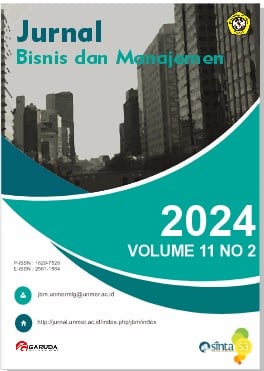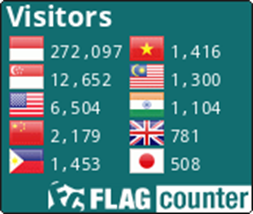Certification and Lecturers’ Performance in State Polytechnic: a Mediating Role of Psychological Empowerment
DOI:
https://doi.org/10.26905/jbm.v11i2.13946Keywords:
Certification, Psychological Empowerment, Lecturers’ PerformanceAbstract
This research aims to test and analyze the influence of certification on lecturer performance which is mediated by the psychological empowerment variable. The population in this study were lecturers majoring in commercial administration at the Malang State Polytechnic with a sample size of 66 respondents determined using the Krecjie Morgan table with probability sampling characteristics. The data collection method was carried out by distributing offline questionnaires, then for path analysis using SEM based on SMARTPLS version 3. The research results showed that certification had an effect on psychological empowerment. Psychological empowerment influences lecturers' performance. Certification has no effect on lecturers' performance. The model proposed in this research suggests reviewing the use of renewable learning media to support lecturer performance.Downloads
References
Amalia, L., & Saraswati, T. (2018). The Impact of Competencies Toward Teacher’s Performance Moderated By the Certification in Indonesia. The 2018 International Conference of Organization Innovation, 3(10), 86–98. https://doi.org/10.18502/kss.v3i10.3363
Arefin, M. S., Alam, M. S., Islam, M. R., & Rahaman, M. (2019). High-performance work systems and job engagement: The mediating role of psychological empowerment. Cogent Business and Management, 6(1). https://doi.org/10.1080/23311975.2019.1664204
Atmaja, B. S., & Budi, A. S. L. (2016). The Effect of Brand DNA on the Interactive Marketing: Perspective of Junior Lecturers from the Faculty of Economics of a Catholic University. Procedia - Social and Behavioral Sciences, 224(August 2015), 459–466. https://doi.org/10.1016/j.sbspro.2016.05.421
Auliana, S., & Nurasiah, I. (2017). Penerapan Organizational Citizenship Behavior Dosen di STIE Bina Bangsa. 2(2), 149–162.
Butcher, J., & Stoncel, D. (2012). The impact of a Postgraduate Certificate in Teaching in Higher Education on university lecturers appointed for their professional expertise at a teaching-led university: “It’s made me braver.†International Journal for Academic Development, 17(2), 149–162. https://doi.org/10.1080/1360144X.2011.620107
Daromes, F. E. (2015). Lecturer Certification in the Perspective of Performance Measurement Systems and Mental Models. SSRN Electronic Journal, 1(20), 8–10. https://doi.org/10.2139/ssrn.3364034
Fernandes, P. R. da S., Jardim, J., & Lopes, M. C. de S. (2021). The soft skills of special education teachers: Evidence from the literature. Education Sciences, 11(3). https://doi.org/10.3390/educsci11030125
Fitriana, A. D. (2022). Personal Branding: Strategi Membangun Reputasi Dosen Di Media Digital. Jurnal Komunikasi, 16(2), 121–133. https://journal.trunojoyo.ac.id/komunikasi/article/view/12792
Franke, G., & Sarstedt, M. (2019). Heuristics versus statistics in discriminant validity testing: a comparison of four procedures. Internet Research, 29(3), 430–447. https://doi.org/10.1108/IntR-12-2017-0515
Hair, J. F., Hult, G. T. M., Ringle, C. M., & Sarstedt, M. (2014). A Primer on Partial Least Squares Structural Equation Modeling (First Edit). SAGE Publications. https://doi.org/10.1016/j.lrp.2013.01.002
Hair, J. F., Risher, J. J., Sarstedt, M., & Ringle, C. M. (2019). When to use and how to report the results of PLS-SEM. European Business Review, 31(1), 2–24. https://doi.org/10.1108/EBR-11-2018-0203
Hall, M. (2008). The effect of comprehensive performance measurement systems on role clarity, psychological empowerment and managerial performance. Accounting, Organizations and Society, 33(2–3), 141–163. https://doi.org/10.1016/j.aos.2007.02.004
Henseler, J., Ringle, C. M., & Sarstedt, M. (2015). A new criterion for assessing discriminant validity in variance-based structural equation modeling. Journal of the Academy of Marketing Science, 43(1), 115–135. https://doi.org/10.1007/s11747-014-0403-8
Husband, G. (2018). The professional learning of further education lecturers: effects of initial lecturer education programmes on continuing professional learning in Scotland and Wales. Research in Post-Compulsory Education, 23(2), 159–180. https://doi.org/10.1080/13596748.2018.1444384
Indriantoro, N., & Supomo, B. (2016). Metode Penelitian Bisnis (Pertama). BPFE.
Jácome, I., & Chión, S. (2022). Psychological Empowerment and Job Stress in Higher Education Institutions in Ecuador. Psychology Research and Behavior Management, 15(November), 3297–3312. https://doi.org/10.2147/PRBM.S381342
Jordan, G., MigliÄ, G., Todorović, I., & MariÄ, M. (2017). Psychological empowerment, job satisfaction and organizational commitment among lecturers in higher education: Comparison of six CEE countries. Organizacija, 50(1), 17–32. https://doi.org/10.1515/orga-2017-0004
Latham, G. P., & Locke, E. A. (1991). A Theory of Goal Setting and Task Performance. Organizational Behavior and Human Decision Processes, 16(2), 212–247. https://doi.org/10.2307/258875
Limbong, M., & Lumbantoruan, J. H. (2022). The Effect of Government Teacher Certification on Teaching Performance: Certified vs uncertified. Utamax : Journal of Ultimate Research and Trends in Education, 4(3), 202–212. https://doi.org/10.31849/utamax.v4i3.11353
Lubis, F. W., & Harahap, H. (2017). Lecturer Certification and The Teaching-Learning Process Quality in Universitas Sumatera Utara. International Conference on Social and Political Development, 136(2nd), 580–602. https://doi.org/10.2991/icosop-17.2018.89
Ma, L., Zhou, F., & Liu, H. (2021). Relationship Between Psychological Empowerment and the Retention Intention of Kindergarten Teachers: A Chain Intermediary Effect Analysis. Frontiers in Psychology, 12(February), 1–11. https://doi.org/10.3389/fpsyg.2021.601992
Madya, S. (2007). Certification for Teachers and Lecturers and Its Implications for Staff Development. Journal of English and Education, I(1), 1–7.
Meng, Q., & Sun, F. (2019). The impact of psychological empowerment on work engagement among university faculty members in China. Psychology Research and Behavior Management, 12, 983–990. https://doi.org/10.2147/PRBM.S215912
Nurzaman, L., & Amalia, L. (2022). The Effect of Emotional Intelligence and Spiritual Intelligence on Lecturer Work Performance. 1(1), 50–71.
Palupi, D. A. P., Cahjono, M. P., & Dananti, K. (2018). Evaluation model: A performance appraisal model for certified lecturers. SHS Web of Conferences, 49(02003), 1–8. https://doi.org/10.1051/shsconf/20184902003
Pilarta, A. B. (2015). Job Satisfaction and Teachers Performance in Abra State Institute of Sciences and Technology. Global Journal of Management and Business Research: A Administration and Management, 15(4), 80–86.
Prasetio, A. P., Azis, E., Fadhilah, D. D., & Fauziah, A. F. (2017). Lecturers’ Professional Competency and Students’ Academic Performance in Indonesia Higher Education. International Journal of Human Resource Studies, 7(1). https://doi.org/10.5296/ijhrs.v7i1.10902
Putra, Y. S., Suharti, L., & Sasongko, G. (2022). Developing innovative work behavior: The influence of psychological empowerment and intergenerational learning. Jurnal Ekonomi Dan Bisnis, 25(2), 435–452. https://doi.org/10.24914/jeb.v25i2.5327
Retnowati, T. H., Mardapi, D., Kartowagiran, B., & Hamdi, S. (2021). A Model of Lecturer Performance Evaluation: Sustainable Lecturer Performance Mapping. International Journal of Instruction, 14(2), 83–102. https://doi.org/10.29333/iji.2021.1426a
Schuberth, F., Henseler, J., & Dijkstra, T. K. (2018). Confirmatory composite analysis. Frontiers in Psychology, 9(DEC), 1–14. https://doi.org/10.3389/fpsyg.2018.02541
Sholihin, M., & Ratmono, D. (2013). Analisis SEM-PLS dengan WarpPLS 3.0. Andi Offset.
Suherman, E., Suroso, Rismayadi, B., & Sihabudin. (2023). Mediating Effect of Psychology Empowerment on the Influence of Knowledge Sharing to Lecturer Performance: An Empirical Study in UBP Karawang (Issue 14). Atlantis Press International BV. https://doi.org/10.2991/978-94-6463-008-4_56
Wahyudi, Sutoro, M., & Mukrodi. (2021). Reality of Lecturers’ Performance, What’s Next? The 1st International Conference on Research in Social Sciences and Humanities (ICORSH 2020), 584(1), 320–324. https://www.atlantis-press.com/proceedings/icorsh-20/125962358
Yusefi, E., Samiee Zafarghandi, M., & Taleb, Z. (2022). Predicting the Psychological Empowerment of Faculty Members Based on the Spiritual Leadership Model. International Journal of Ethics & Society, 3(4), 16–24. https://doi.org/10.52547/ijethics.3.4.16
Downloads
Additional Files
Published
How to Cite
Issue
Section
License
Authors who publish with this journal agree to the following terms:
(1) Copyright of the published articles will be transferred to the journal as the publisher of the manuscripts. Therefore, the author confirms that the copyright has been managed by the journal.
(2) Publisher of Jurnal Bisnis dan Manajemen is University of Merdeka Malang.
(3) The copyright follows Creative Commons Attribution–ShareAlike License (CC BY SA): This license allows to Share — copy and redistribute the material in any medium or format, Adapt — remix, transform, and build upon the material, for any purpose, even commercially.














